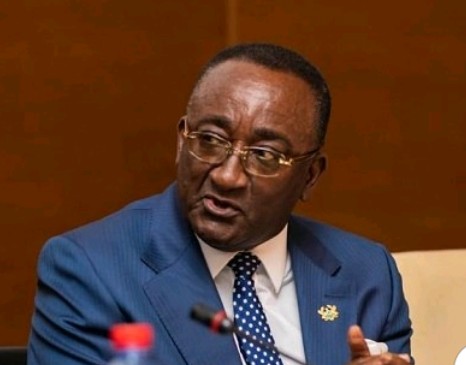Minister for Food and Agriculture, Dr. Owusu Afriyie Akoto, has said that harmful chemicals used in illegal mining is the greatest threat to cocoa production in the country.
The Minister is worried that cyanide and other chemicals used in water bodies in cocoa farming areas are endangering the country’s cocoa sector.
He said the practice could lead to a ban of Ghana's cocoa beans on the international market, with an adverse effect on the country’s economy.
Currently in Europe, there is new legislation that could soon make Ghana’s cocoa and coffee unexportable to many foreign countries.
Speaking to LUV News, Dr. Owusu Afriyie Akoto noted that the issue must be addressed urgently to safeguard the country’s export of cocoa.
“It is very important. It is the water pollution, cyanide and other chemicals, mercury that go into the food chain and ends up in our stomachs. To me, that is the most dangerous part, it is not the quantity but it is the negative environmental impact…If we send a consignment of cocoa to say Belgium and they tested and find any trace, they could ban our cocoa exports.
“So it is not so much the impact of the production as to endangering our international trade, and the only thing we have is cocoa. Immediately, the danger of these cyanides and these very dangerous chemicals going into our products, which we send abroad, will endanger our export earnings which for me is the biggest concern,” he stated.
Meanwhile, the European Union has threatened to impose restrictions on Ghana and Cote D’Ivoire with regard to cocoa exportation into ports of their member countries if the destruction that is being caused by illegal mining is not dealt with.
Deputy CEO of COCOBOD, Dr. Emmanuel Agyeman Dwomoh, revealed this during the national Consultative Dialogue on Small Scale Mining in April last year.
The EU also believes growing of cocoa in the thick forest might be one of the driving forces.
“As we speak, EU is threatening to impose restrictions on the importation of cocoa from Ghana and Côte d’Ivoire to their ports.”
He added, “When you take the satellite images, you will see those places in red. The EU thinks that all those places are red because cocoa is causing land degradation [in Ghana]. Meanwhile, it is as a result of the galamsey activities.”
Ghana exports 80% of its cocoa into the European Union market, according to COCOBOD. Stakeholders are therefore worried about the impact of the galamsey menace on the finances of the country and the cocoa sector.
Latest Stories
-
‘Time will tell’ – Kofi Adams on GFA’s decision to keep Otto Addo
36 minutes -
Today’s Front pages: Tuesday, March 18,2025
50 minutes -
We will refurbish Cape Coast Stadium and keep it for Black Stars matches only – Kofi Adams
51 minutes -
Government to close Accra Stadium for renovation after Chad game- Sports Minister
1 hour -
Not every dispute needs to be litigated – Chief Justice
2 hours -
Amin Adam questions feasibility of Women’s Development Bank
2 hours -
Gun attack in Binduri leaves two dead
2 hours -
NDC’s 24-Hour Economy Policy lacks credibility – Amin Adam
2 hours -
Ghana pursuing to host Advisory Centre on International investment law
2 hours -
Trader arrested on his wedding day over visa fraud in court
2 hours -
Amin Adam insists Akufo-Addo gov’t managed economy responsibly
2 hours -
‘We taxed bet winnings, not lottery winnings’ – Former Finance Minister sets record straight
2 hours -
Mahama’s dismissal of senior Generals hurts military morale – Ntim Fordjour
3 hours -
Illegal miner jailed for stealing
3 hours -
Head potter on bail for stabbing driver
3 hours

